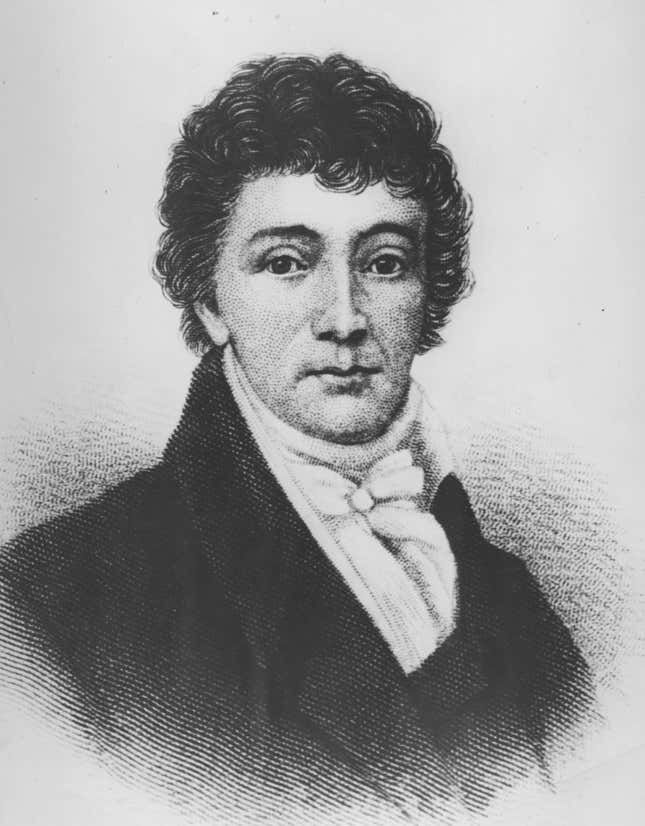
The tragic bridge collapse in Baltimore is sure to dominate news coverage for the next several days - unless Donald Trump sneezes.
It is a terrible tragedy (the bridge collapse; not the prospect of Trump sneezing.) Six are presumed dead after a giant freighter, which had lost power and steering, crashed into the base of the Francis Scott Key Bridge in Baltimore, knocking the bridge down into the Patapsco River.
President Joe Biden has pledged that the bridge will be rebuilt. Absolutely. Do that. But when it’s rebuilt, let’s rename it, too.
Francis Scott Key wrote “The Star Bangled Banner,” our national anthem. A lawyer and amateur poet. Key wrote the song in 1814 after being heartened to see that our flag still flew over Fort McHenry despite sustained bombardment by the British during the War of 1812.
Holding onto the fort was a pivotal moment in the war; the still-new United States would maintain its independence from Great Britain, and, in 1931, Key’s “Banner” would be declared the national anthem.
All of that, cool. Great. A revered part of U.S. history. Undeniable. Nobody needs to try to rewrite it or deny it.
But Key? We should not, in 2020-whenever-the-bridge-is-rebuilt, be naming things in honor of former slaveholders.
Yep, Key had that colonial fever. He bought his first slave in 1800 or 1801. Even at that long-ago date, slavery had ceased being an unquestioned aspect of American life.
There were people who questioned its morality, abhorred its horrors. Key bought a few more Black people during his life and had seven or eight when he died in 1843.
As an attorney, Key represented some freedom-seeking slaves and slave owners who wanted their human property returned.
He is said to have argued passionately in favor of the wrongs of slavery. And yet, in the unsuccessful prosecution of a man who had anti-slavery pamphlets in his possession, the slave-owning Key, according to a 2007 collection of pamphlets edited by Paul Finkelman, attempted to inflame the jury with these words:
“Are you willing, gentlemen, to abandon your country, to permit it to be taken from you, and occupied by the abolitionist, according to whose taste it is to associate and amalgamate with the negro? Or, gentlemen, on the other hand, are there laws in this community to defend you from the immediate abolitionist, who would open upon you the floodgates of such extensive wickedness and mischief?”
Let me say that in 2024 words:
“White men, ya’ll sure you want to have your country taken from you and occupied by N-lovers, who might well want you and your women to get with them Ns? Or, are there laws in the country to stop them crazy N-lovers from unleashing those Ns on you and yours?”
That Key’s argument wasn’t successful doesn’t free him from the shackle of having made it. And, of course, there are those Black people he bought and owned.
So, when the new bridge spans the Patapsco, name it something other than the Key Bridge.
Lots of Americans — hell, lots of Marylanders — are far more worthy of the honor. Harriet Tubman and Frederick Douglass immediately come to mind.
Hell, we don’t even have to go back that far. What about Thurgood Marshall? Or the late congressman, Elijah Cummings?
The point is, Maryland and Baltimore don’t have to do what they did before.
I know there are those who are frothing now, pointing out that I’m “playing the race card” during this tragedy.
And my response is…yep, I am most definitely doing precisely that.
If, after this tragedy, we can focus on the urgent need to turn away from spit-in-the-face insults to Black Americans, count me in on some of that.
Key wrote a historically important song at a historically important moment. Let him have that. Let us all have that new bridge and the future that comes after it’s built.
Wayne Washington is a brilliant journalist based in Florida.

